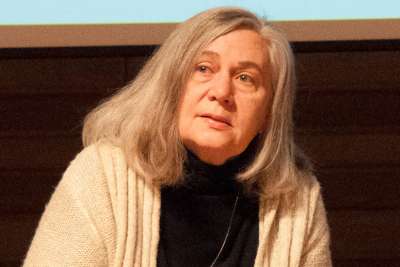American Marilynne Robinson was in TVO’s Toronto studio talking about a lot more than just her new book What Are We Doing Here?, a commanding and challenging collection of essays probing questions of faith and doubt, history and ideology that both divide and bring us together in western civilization, particularly in today’s America.
Baby Boomers — those in their mid-50s to mid-70s — were generally taught that talking in public about religion and politics is taboo, at least taboo if you wanted to have friends. But that has changed in recent years as ideology seeps through society and over reason and civil debate.
Listening to Robinson was compelling: “A religious monoculture in the U.S. is a new idea,” “people are taking cynical and opportunistic use of religion,” “Barack Obama is a truth-loving, honest, kind man — a true Christian,” and “a human soul is a human soul, who may or may not have gone to graduate school.”
She told the story of her mother, a shut-in her final years who obsessively watched Fox News. “She adopted fears and resentments that had no basis from her own life experience,” Robinson says.
In her book, Robinson writes: “My mother lived out the end of her fortunate life in a state of bitterness and panic, never having had the slightest brush with any experience that would confirm her in these emotions, except, of course, Fox News.”
Describing herself as a “practising Christian,” Robinson explained why “liberal Christian” is not a contradiction in terms, even in America. In a nutshell, the First Amendment’s freedom of religion was, and is, a liberal value, she said.
But the religious right in America, many of whom back President Donald Trump, promote a “Christian monoculture” never intended by the founding fathers, who wanted a plethora of beliefs to flourish, but separate from the state.
“A genius of polarization,” she said, referring to Trump’s so-called base that overlooks his indiscretions that are clearly at odds with their stated religious beliefs. “Very irrational and very undignified.”
She says these people and their polar opposites, the “New Atheists,” deserve each other with their smug certitudes.
Robinson’s polite but firm disdain for Trump is matched by her respect for Obama, who like her, is associated with the congregationalist United Church of Christ.
Liberal Christians like herself are still out there but many are hesitant to speak up about their beliefs for fear of attack from Fox News and others.
“It’s embarrassing that people have been shamed into silence,” Robinson says. She writes: “I’m too old to mince words.”
This is her sixth non-fiction book to go along with four acclaimed novels and four prestigious awards: the Pulitzer Prize, the Hemingway Foundation/PEN Award, the National Book Critics Circle Award and the Women’s Prize for Fiction, the United Kingdom’s most prestigious award for fiction written by a woman.
The New York Times describes her writing as “elegant” in the way she folds questions of faith and ethics into human dramas. “She has been compared to the Dutch masters for her sense of silence and light, for the quality of patient attention that gilds the most modest moments. But she also has a gift for wit and metaphor that turns the ordinary on its head.”
The fascinating thing about Robinson on television is her gentle manner, undoubtable knowledge and inner courage to defend her beliefs. She presents her views with sound reason, not loud shouts. “I’d like to urge people beyond polarization,” she says.
In What Are We Doing Here? she says, “I know it is conventional to say that we Americans are radically divided, polarized. But this is not more true than its opposite — in essential ways we share false assumptions and false conclusions that are never effectively examined because they are indeed shared.”
Most of the essays in the book were originally delivered as lectures at churches, seminaries and universities before Trump’s election. They have a tone of a well-written, thought-provoking homily.
Whether one agrees with her views or not, we should all embrace her intellect and her manner. To solve the myriad of problems in the world, we need more of the reasoning and candid dialogue she exhibits and less ideology and shouting.
(Brehl is a writer and author of several books.)
Liberal Christians like herself are still out there but many are hesitant to speak up about their beliefs for fear of attack from Fox News and others, Brehl writes.
Wikimedia Commons
Bob Brehl: Author speaks up for liberal Christians
The other night I was watching TVO’s The Agenda and an erudite, award-winning author was talking about two taboos: politics and religion. It was fascinating television on several levels as she linked the two in Trump’s America.
Tagged under:


